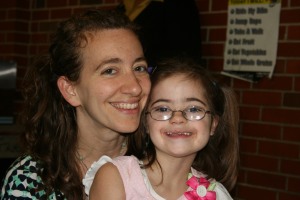 First, an introduction to Julianna-speak:
First, an introduction to Julianna-speak:
- Kwawk-wee–chocolate
- Kee-yoh–carousel
- Kohl-ee–Nicholas
- Al-ee–Alex
- Bah-koh–Michael
- Bah-ee–Mommy
- Geepaw Geepaw–Grandpa (or Grandma, or both)
- wei-ee yah-yee–swim lessons
- wah bee-bah–watch baby signing times (but it means “movie”)
- pah-tah–pasta
- Hah boh-bee–happy birthday
- hoe-ee–horsie
- geiger–tiger
- goggie–dog
- Beebee Iccshee–Baby Izzie. (Not sure how to put that consonant into letters; it’s in the back and the front of the mouth simultaneously, a sound related to both sh and the French r.)
- Wow-kuh–fire truck
- bih bugee–big bug
- lee bugee–little bug
- wow doy–loud noise
Go on, try saying these out loud. See if you can hear the original word buried in hers.
Julianna has difficulty with speech because her tongue is larger proportional to the size of her mouth, and because of low muscle tone, which makes it harder for the muscles to work together. If you think about it, speech is the finest possible fine motor skill the body performs. Minute variations of the tongue, the cheeks, the lips and the teeth create a vast array of sounds.
The human brain can clump sounds together that actually aren’t the same. For instance: Huge swaths of the population seem incapable of putting s, t and r back to back clearly. “Strong” becomes “shtrong,” thunderstorm “thundershtorm.” Yet we recognize the words despite mispronunciation. This also accounts for being able to talk to people with different accents.
Watching Julianna learn to talk has taught me how closely-related the various sounds really are. When he was little, Alex used to say “kyack” instead of “truck.” At first blush that sounds not even remotely similar, but say “truck” and pay attention to where your tongue hits. Now say “Kyack.” Both of them begin with an explosive consonant on the roof of the mouth, followed by pulling the tongue back for a vowel that sits in virtually the same place.
So it is with Julianna’s speech. One of the first phrases we identified was “wah bee-boh,” which literally translates “watch baby signing times,” but in reality means “movie, please.” Baby = beebee, shortened to bee. Signing and Times both have long I’s, but the shape required to produce a long I is not that far removed than that for a semi-long o.
The thoughts she’s trying to express are getting more sophisticated–she is, after all, six years old; imagine being six and not able to communicate in complete sentences. But as they get more sophisticated, they become harder to decode. Nicholas continues to boggle my mind by being able to understand things the first or second time he hears them. Maybe, being not far removed from that developmental stage where all sound combinations are a bit suspect, he’s got the brain plasticity to run through the myriad possible combinations and come up with the right one to fit the context. Or maybe this is an early indicator that he’s going to have a gift for languages. Who knows? In any case, I’m becoming more grateful for his gift every day, and although mostly I wanted to record this for my own memory, I thought other people might find it interesting as well.
And just for fun, here’s Julianna reading with Christian last night:
Have you given any though to teaching her asl? I’ve heard some folks to that with kids with DS because it is physically easier than speech and gives them language. Of course the rest of the family would have to learn it too–and I suppose the disadvantage would be a lessening of the desire to learn to speak
She’s done a lot of sign language, the mix of ASL and “baby” that Rachel Coleman does. But it’s always been a stepping stone to speech for us–to function in the big world, she’ll have to be able to talk.
That’s awesome to see her reading!
This was a real treat to hear her voice. It was actually quite easy to understand most of her words. But then again, for many years I could also read and translate into typed word multiple physicians handwriting. Kinda on the same level. Bright people – just communicating differently. Love that girl.
🙂 And I love your comparison!
My son does not have DS but reading your daughters pronunciations reminded me of how he used to talk. A few years of speech therapy helped him to learn proper placement of his tongue and now he doesn’t talk that way anymore although we sometimes reminice of the funny words he made up. He said “dob dobbie” for bottle cap, “Bobbies” for potato chips and he left off the beginning and end of all his words. I was so used to it that I understood most of what he said. lol. God bless you for the wonderful job you are doing with your beautiful little girl!
Thanks for sharing, Alicia!
I thought she did very well and could understand a lot of what she read. I was impressed with how she pronounced “homework” and “especially!”